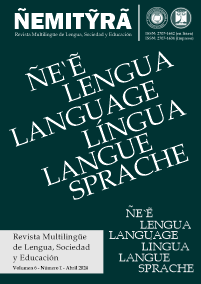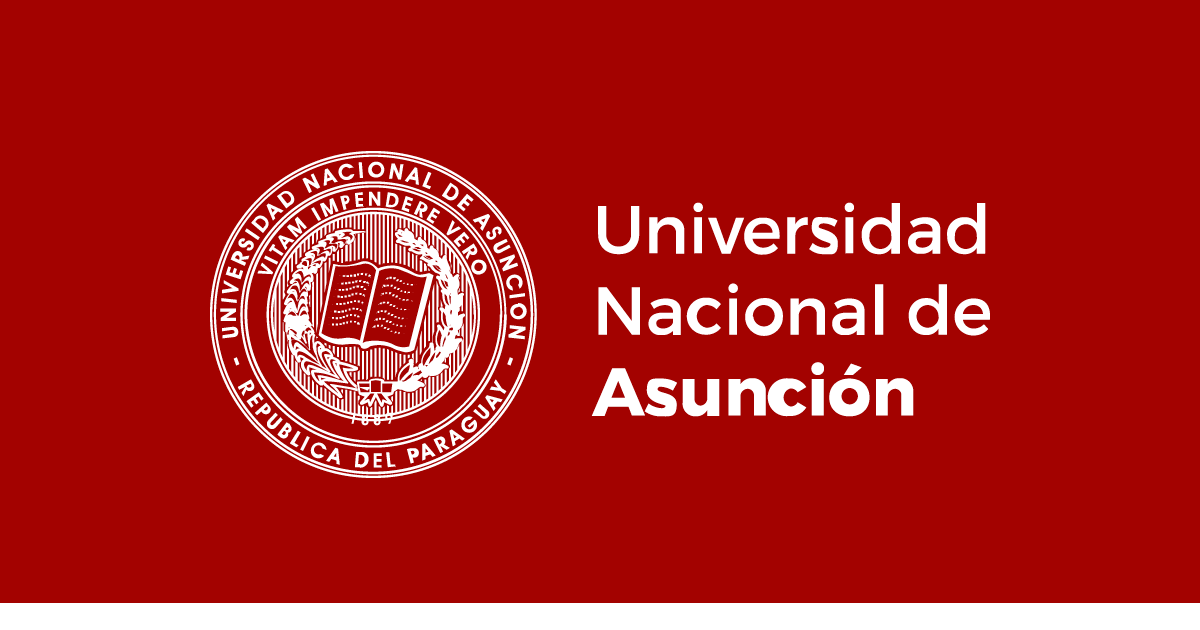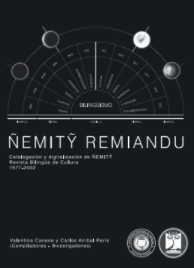A Grappling with power and privilege in the United States: One queer TESOL professional's autoethnographic inquiry
DOI:
https://doi.org/10.47133/NEMITYRA20240601-A1Palabras clave:
autoethnography, oppressive dynamics, privilege, ESOL, critical reflectionResumen
Previous research, including the author’s own, has affirmed the presence of oppressive dynamics throughout the American education system, including adult English to Speakers of Other Languages (ESOL) programs. Yet, addressing these dynamics in classroom instruction and program administration is relatively absent in preservice preparation programs and continuous professional development for educational professionals. Similarly, the vital importance for educators to reflect on these oppressive dynamics and explore how they might manifest within themselves and impact them professionally has also been identified. Inspired by Gerald (2022), the author embarked on an autoethnographic inquiry that focused on oppressive dynamics based on their prevalence in American society (racism and sexism) and their personal relevance (homo- and transphobia). Critical race and intersectionality theories were the conceptual frameworks used for this investigation, including the personal and professional impact on the author/research subject and their presence among participants in the research he has conducted. The goal was to scrutinize the context of instruction (i.e., American history, society, and culture), to share the author’s reckoning with these dynamics, including power and privilege, and to prompt other educators to make similar introspective journeys. Limitations and areas for future study, including inquiries in other countries/contexts, were also discussed.
Referencias
Adams, T. E., Boylorn, R. M., & Tillmann, L. M. (2021). Righting and writing (out) our lives: Turning inward when the world falls apart. In T. E. Adams, R. M. Boylorn, & L. M. Tillmann (Eds.), Advances in autoethnography and narrative inquiry: Reflections on the legacy of Carolyn Ellis and Arthur Bochner (pp. 1-11). Routledge.
Bochner, A. P. (2000). Criteria against ourselves. Qualitative Inquiry, 6(2), 266-272. https://doi.org/10.1177/107780040000600209
Bochner, A. P., & Ellis, C. (2021). Autoethnography as a warm idea. In T. E. Adams, R. M. Boylorn, & L. M. Tillmann (Eds.), Advances in autoethnography and narrative inquiry: Reflections on the legacy of Carolyn Ellis and Arthur Bochner (pp. 250-254). Routledge.
Brookfield, S. D. (2017). Becoming a critically reflective teacher (2nd ed.). Jossey-Bass.
Chesler, P. (2018). Women and madness. Lawrence Hill Books.
Closson, R. B. (2010). Critical race theory and adult education. Adult Education Quarterly, 60(3), 261-283. https://doi.org/10.1177/0741713609358445
Cranton, P. (1996). Professional development as transformative learning: New perspectives for teachers of adults. Jossey-Bass.
Crenshaw, K. (1991). Mapping the margins: Intersectionality, identity politics, and violence against women of color. Stanford Law Review, 43(6), 1241-1299. https://doi.org/10.2307/1229039
Crotty, M. (1998). The foundations of social research: Meaning and perspective in the research process. SAGE Publications Ltd.
Delgado, R., & Stefancic, J. (2017). Critical race theory: An introduction (3rd ed.). New York University Press.
Denzin, N. K., & Lincoln, Y. S. (Eds.). (2000). The handbook of qualitative research (2nd ed.). Sage Publications, Inc.
DiAngelo, R. (2018). White fragility: Why it's so hard for white people to talk about racism. Beacon Press.
Ellis, C., Adams, T. E., & Bochner, A. P. (2011). Autoethnography: An overview. Historical Social Research, 36(4), 273-290. https://doi.org/10.12759/hsr.36.2011.4.273-290
Ellis, C. S., & Bochner, A. (2000). Autoethnography, personal narrative, reflexivity: Researcher as subject. In N. Denzin & Y. Lincoln (Eds.), The handbook of qualitative research (2nd ed., pp. 733-768). Sage Publications, Inc.
Farrell, T. S. C. (2012). Novice-service language teacher development: Bridging the gap between preservice and in-service education and development. TESOL Quarterly, 46(3), 435-449. https://doi.org/10.1002/tesq.36
Freire, P. (1970). The pedagogy of the oppressed. Continuum.
Gay, G. (2002). Preparing for culturally responsive teaching. Journal of Teacher Education, 53(2), 106-116. https://doi.org/10.1177/0022487102053002003
Gerald, J. P. B. (2022). Antisocial language teaching: Teaching English and the pervasive pathology of whiteness. Multilingual Matters.
Gross, K. (2020). Trauma doesn't stop at the school door: Strategies and solutions for educators, PreK-college. Teachers College Press.
Grossman, P. L. (1990). The making of a teacher: Teacher knowledge and teacher education. Teachers College Press.
Guy, T. C. (1999). Culture as context for adult education: The need for culturally relevant adult education. In T. C. Guy (Ed.), Providing culturally relevant adult education: A challenge for the twenty-first century (pp. 5-18). Jossey-Bass Publishers.
Hager, B. A. (2022). Autoethnography in research: An interview with Dr. Robin Grenier. New Horizons in Adult Education & Human Resource Development, 34(3), 69-75. https://doi.org/10.1002/nha3.20362
Hayano, D. M. (1979). Autoethnography: Paradigms, problems, and prospects. Human Organization, 38, 113-120.
Housel, D. A. (2022a). Instructors reflect on how their preservice preparation and ongoing professional development prepared them to address oppressive dynamics in adult ESOL programs in the United States. Equity in Education & Society, 1(2), 186-201. https://doi.org/10.1177/27526461221102962
Housel, D. A. (2022b). An exploratory study of instructors who became administrators of post-secondary ESOL programs in the United States. The Journal of Continuing Higher Education. https://doi.org/10.1080/07377363.2022.2069984
Housel, D. A. (2023). In plain sight: Oppressive dynamics and learning challenges in adult ESOL programs in the United States. Equity in Education & Society. https://doi.org/10.1177/27526461221146795
Kendi, I. X. (2019). How to be an antiracist. One World.
Kozol, J. (1991). Savage inequalities. Crown Publishers.
La Barbera, M. (2013). A path towards interdisciplinary research methodologies in human and social sciences: On the use of intersectionality to address the status of migrant women in Spain. The International Journal of the Humanities, 9(12), 193-202. https://doi.org/10.18848/1447-9508/CGP/v09i12/43500
Ladson-Billings, G. (1995). Toward a theory of culturally relevant pedagogy. American Educational Research Journal, 32, 465-491. https://doi.org/10.3102/00028312032003465
Ladson-Billings, G. (1998). Just what is critical race theory and what is it doing in a nice field like education? Qualitative Studies in Education, 11(1), 7-24. https://doi.org/10.1080/095183998236863
Ladson-Billings, G., & Tate, W. (1995). Toward a critical race theory of education. Teacher's College Record, 97(1), 41-62.
Lawrence, C. (1987). The id, the ego, and equal protection: Reckoning with unconscious racism. Stanford Law Review, 39, 317-388. https://doi.org/10.2307/1228797
Martin, F., Pirbhai-Illich, F., & Pete, S. (2017). Beyond culturally responsive pedagogy: Decolonizing teacher education. In F. Martin, F. Pirbhai-Illich, & S. Pete (Eds.), Culturally responsive pedagogy: Working towards decolonization, indigeneity, and interculturalism (pp. 235-256). Palgrave Macmillan.
Mezirow, J. (1991). Transformative dimensions of adult learning. Jossey-Bass.
Paris, D., & Alim, H. S. (Eds.). (2017). Culturally sustaining pedagogies: Teaching and learning for justice in a changing world. Teachers College Press.
Patton, M. Q. (2015). Qualitative research & evaluation methods (4th ed.). SAGE Publications, Inc.
Pharr, S. (1988). Homophobia: A weapon of sexism. Chardon Press.
Poulos, C. N. (2021). Essentials of autoethnography. American Psychological Association.
Richardson, L. (2000). Writing: A method of inquiry. In N. Denzin & Y. Lincoln (Eds.), The handbook of qualitative research (2nd ed., pp. 923-948). Sage Publications, Inc.
Roy, L. A. (2018). Teaching while white: Addressing the intersections of race and immigration in the classroom. Rowman & Littlefield.
Schön, D. (1983). The reflective practitioner: How professionals think in action. Basic Books.
Shulman, L. S. (1986). Those who understand: Knowledge growth in teaching. Educational Researcher, 15(2), 4-14. https://doi.org/10.3102/0013189X015002004
Stojanović, M. (2022). A teacher, an advisor, and a counselor: An autoethnographic narrative of an English language instructor. Adult Learning, 33(4), 182-190. https://doi.org/10.1177/10451595221112478
United States Census Bureau. (2022). Gender pay gap widens as women age. https://www.census.gov/library/stories/2022/01/gender-pay-gap-widens-as-women-age.html
Wall, S. (2008). Easier said than done: Writing an autoethnography. International Journal of Qualitative Methods, 7(1), 38-53. https://doi.org/10.1177/160940690800700103
Publicado
Número
Sección
Licencia
Derechos de autor 2024 David Housel; y Revista Ñemitỹrã

Esta obra está bajo una licencia internacional Creative Commons Atribución 4.0.










